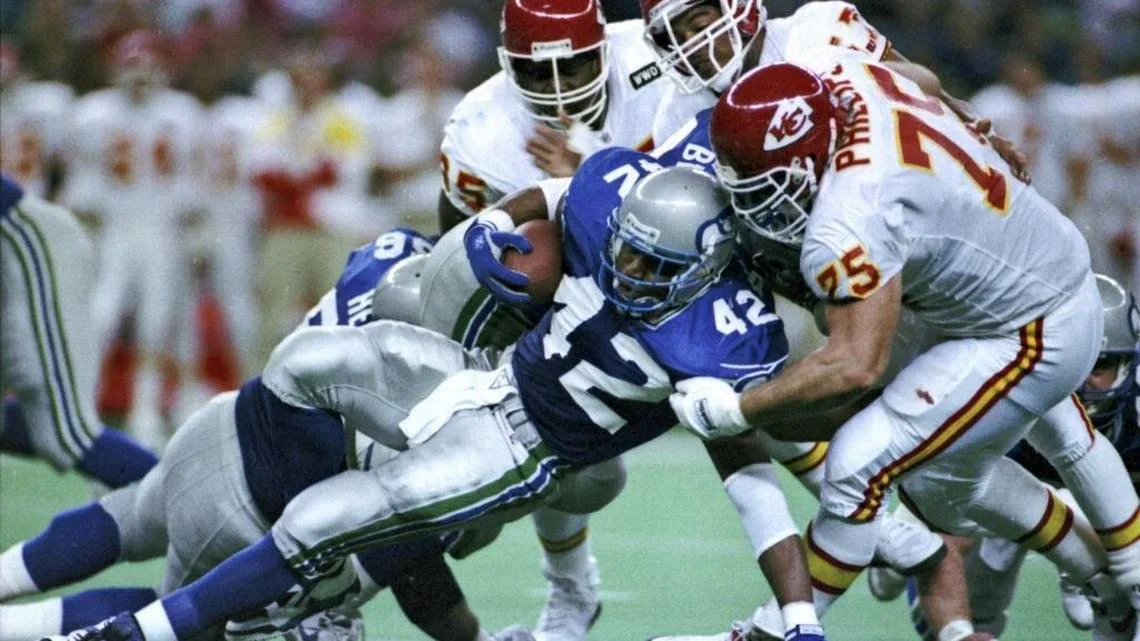Buy the king of Halloween
Leachman tells the story of...
a life in football from a daughter’s perspective. It provides an intimate look at one family’s rise through the ranks of competitive football—from player to high school, then college coaching; followed by coaching in the WFL, CFL, and NFL, and ultimately to Super Bowl champions. It also chronicles the family’s struggle to deal with and understand the decline of the father who was at the center of this lifestyle from CTE.
The first 2/3rds of the book present the Leachman family’s rise through the ranks of football coaching: starting as a high school football coach in Savannah, Georgia, progressing to college coaching at a variety of schools in the South, and then heading north to coach for the defunct World Football League, the Canadian Football League, and ultimately the National Football League. Given, the time period, 1960-1990s, the book also addresses the issue of racial relations in the South during the period of school integration.
The last 1/3rd of the book chronicles the Leachman family’s struggle to deal with the growing incapacity of the patriarch, and to understand the causes of that decline. Lamar Leachman was ahead of the curve with respect to the onset of his disease. He began showing signs of degeneration in the early 1990s, long before the presence of any medical evidence, and a decade before the NFL would acknowledge the existence of CTE, and its link to football.
Told in a rich Southern voice, this is a story of one family’s love of a game and each other. It is a story of one man’s strength of character and the woman’s love that sustained him. It is a coming of age story of a strong-willed, independent young woman. It is a story that will make you laugh and make you cry.
Endorsements for The King of Halloween and Miss Firecracker Queen
“With humor and grace Leachman has woven a tale about a smart, headstrong southern girl coming of age in a male-centric world. Full of tragedies and triumphs, it is a powerful love story of one family’s devotion to a game and each other.”
— Katharine Ashe, USA Today bestselling author of THE DUKE.
“A daughter’s heartwarming account of growing up in a football family. A family’s heartbreaking account of dealing with neurodegenerative disease.”
— Kevin Guskiewicz, MacArthur Genuis Award Winner; member NCAA Concussion Committee, director Center for the Study of Retired Athletes
"Ultimately, it is a story of her parents’ marriage, growing up in the South and then losing the father who stood at the center of it all.”
— Jill McCorkle, author of Life After Life, among others; Member of the Fellowship of Southern Writers
Reader Reviews
“Lamar Leachman was a mythic figure. With his huge biceps and tiny waist (and small, knock-kneed legs), his booming voice, his outrageous sense of humor, he made even football stadiums seem smaller when he entered them.
In her book, Lori Leachman has done her giant of a father justice, if, at times, rough justice.
Everybody who cares about football or Southern culture should at least eyeball this honest, loving portrait of, yes, family and football.
Ron Smith
Groves High School #62, University of Richmond #64, Poet Laureate of Virginia 2014-2016” (Amazon)
"What a poignant and forthright account of growing up in the south, in a family both enriched by, and sacrificed for, football. So many memoirs suffer from a palpable sense of embellishment. Whether they focus on poverty, family dysfunction, mental illness or tragic-comic events, you can almost feel the undercurrent of self-importance - the "big reveal" moments heavily foreshadowed, the "pivotal developments" supposedly recognized as such by the author as they occurred. Who experiences life like that? Maybe its the process of turning a memory into an event in a novel that pushes some memoirs into that realm of narrative overreach. To her considerable credit, Leachman does not add such literary gloss. As narrator she is amazingly honest, at times hilarious, and she effectively intersperses the chronology of the story with details or truths that emerged only years later. Her tales of family life and coming of age in the rural south, before helicopter parenting and political correctness took hold of the national psyche, remind me of the style of storytelling on Stranger Things (perhaps not at all coincidentally, written by two guys who grew up in Durham NC in the 1970s and 80s). Having watched and tended to a parent who suffered from and succumbed to dementia, I can attest that her description is blisteringly accurate, and so painful it was difficult at times to read. Bravo." (Amazon)
"Leachman's tender and insightful memoir gently and without judgment exposes the ways in which other people's romantic illusions of life in pro football are in conflict with the lived experiences of the children growing up behind the thin pink line: Women and children who protect their men and the game at any cost, knowing that football, with all its glory and all its dirty secrets, pays the mortgage and puts food on the table. Leachman tells a story that is at once familiar and yet uniquely hers: A family life gloriously tied up in the sport that will liberate them from bigotry, closed-mindedness and rural poverty, while at the same time sowing the seeds of insidious long-term destruction. Whereas Leachman and her sister created worlds while running around Uncle Ray and Aunt Mable's dry goods store, for me and my sister, it was Thomas and Bernyce Bridgeman's Hardware store in Mineral Springs, Arkansas that ignited a creativity and freedom that would lay the groundwork for our future careers. Our football families harbored secrets, not the least of which was CTE, or chronic traumatic encephalopathy, the neuro-degenerative disease that slowly eroded our fathers' minds and our families' stability. And yet, what else we were all to do?
Like great personal memoirs such as Mary Karr's The Liars' Club and Jeannette Walls The Glass Castle, Leachman's The King of Halloween and the Firecracker Queen will take its place among the new genre of great American memoir - insightful, honest writing that documents a woman becoming the protagonist of her own life against tremendous odds." (Amazon)
Introduction: The King of Halloween and the Firecracker Queen
My daddy was the second child born into a family of four children with an alcoholic father, and born-again Christian mother. He tested the limits of his mother’s Christian tolerance with youthful pranks, adolescent drinking, card playing and betting. Grandma Leachman responded with the philosophy of spare the rod, spoil the child. In fairness to her, this was probably an attempt to bring some order to her brood of wild boys, wilder husband, and one darling girl. Nonetheless, her philosophy involved such punishments as locking her children in a black closet when they misbehaved. In theory, they would come to Jesus in the dark, and repent their sins.
For the rest of his life my father could not stand to be in a dark room or darkened space. Upon entering a room or house, his first motion was always to switch on the light. If, on a rare occasion, we would come home and find Daddy home alone, he would have a light on in every room of the house. No doubt this upbringing contributed to the fact that none of the Leachman boys were resilient—except Lamar. And his resilience depended on my mother Paula, his wife. But Paula was no angel. She was the fire in the belly of their collective ambition. She was the fire licking at the heels of my dad’s devilishness.
They built a life together on the foundation of competitive football that was both exhilarating and heartbreaking. Football was my family’s salvation and destruction. It supported us. It set the pace of our daily lives. It opened doors for us. It provided us with community. Yet, it was the source of our family’s greatest sorrow.
This is my story of a football life; a life that was totally male centric, completely focused on physical excellence and mental toughness, never routine, always preoccupied with winning, and continually idolized by those outside of the profession. It was a life characterized by its own particular rhythm and seasons, the seasons of football.
Forewords by Phil Simms and Harry Carson
Phil Simms, quarterback New York Giants 1979−1993; Super Bowl XXI most valuable player; analyst CBS’s NFL Today Show; host Inside the NFL.
From 1979 to 1993, I quarterbacked the New York Giants. During my tenure with the Giants we won two Super Bowls based on the strength of both our offense and defense, and the quality of our coaching staff.
During the majority of my time playing for the Giants, Lamar Leachman coached the defensive line. We had a very good relationship. We were always talking about football and our families. There is no doubt we both had a lot in common. I grew up in Kentucky. He grew up in Georgia. We both had similar upbringings, and a tremendous love for football and the NFL.
Lamar was a big personality. He walked around with a lot of swagger. You always knew when he would walk into a room because he was loud; talking and laughing, in a way that always created energy for the team. He had good relationships with everybody. Even though he was a coach and ranked above the players, he could talk their language, laugh with them, and still coach his guys very hard.
The King of Halloween and Miss Firecracker Queen is a tribute to Lamar’s spirit as well as a tribute to the football life. It tells the story of one family’s rise through the ranks of competitive football, from the unique perspective of a daughter. It also chronicles the Leachman family’s struggle to understand and cope with Chronic Traumatic Encephalopathy, the tragic consequence of living such a life.
Reading this book will make you laugh and make you cry. It will make you wish you had grown up in such a family, and make you think twice about a life in football.
Harry Carson, inside linebacker New York Giants 1976−1987; member Pro Football Hall of Fame since 2006; arthor of Point of Attack and Captain for Life.
As a player in the National Football League with the New York Football Giants ‘back in the day’ (the 1980s), I had the great opportunity to interact and play for and with many outstanding coaches and players; coaches like Pro Football Hall of Fame head coach Bill Parcells and defensive coordinator and linebacker coach Bill Belichick who is now the head coach of the Super Bowl Champion New England Patriots. Players like Hall of Famer Lawrence Taylor, and Super Bowl XXI’s Most Valuable Player Phil Simms, are the names that standout when faithful Giants fans reminisce about winning Super Bowl XXI and becoming World Champions for the 1986 football season.
Often lost in the discussion of any team’s success are the foot soldiers who do the “grunt” or dirty work that most people don’t see on the surface, but without which the team cannot succeed. My tenure with the Giants started in 1976, so I, for one, consider myself one of the ones that was there playing through those years when the Giants were mediocre at best. That experience has given me a unique sense of history and perspective. Our team’s success was based not solely on one or two ‘stars;’ instead it was based on those players and coaches who in their own way made a difference by playing the role they were assigned, to the best of their ability. Such is the case of Lamar Leachman, our defensive line coach. He helped make our New York Giants defense one of the very best in the National Football League. He was a huge reason for the success of our team. The defensive line is always the first line of defense for every team. Without defensive tackles, nose tackles and defensive ends motivated and coached with the techniques and skills to supply an effective pass rush, and without the toughness to hit and shed blockers to help shut down the opposing team’s running game, pressure at the linebacker and secondary levels can often be intense and exploited.
Lamar was not my position coach, but we had to work together in meetings and on the field as we implemented defensive strategies. In my role as the captain and leader of the New York Giants Defense, I could clearly see on and off the practice and playing fields the respect his players had for him. He worked his players hard. He was brutally honest if he needed to chastise his guys because he felt they could play better and harder. As hard as he could sometimes be on his players, he loved and respected them. They loved and respected him back. No one ever took his words or actions as a coach personally. As a team, we all appreciated his ability to get the maximum effort from his players.
One of the keys to being a ‘good’ to ‘great player’ in any sport is the ability to be ‘coachable;’ to take direction and be willing to change some type of flaw to improve one’s production or effectiveness. This is important for not only the player, but for the team. We all knew Lamar was a ‘taskmaster’ who loved to coach young players and make them better on the football field. If you attended the Giants practice during training camp, it would not take you long to spot Lamar. He was the one flexing his muscles, wearing the sleeveless tee shirt, barking his approval or disapproval with his heavy southern drawl. He was hard on his players, but they loved it. They loved it because they knew he made them better players on the field. More importantly, he earned their respect for being a straight shooter and treating his players as if they were his own sons. His contributions might never be known by the average football fan, but all who played for him, and were a member of our team, know the essence of the man, and what he meant to us as a team.
Several years ago, I began the process of reuniting the 1986 Super Bowl Championship Team for our 25th Anniversary. Of the 53 men on the team roster, 51 of the players came back. Of the Giants coaches, eight of the eleven coaches from the staff of Bill Parcells were also present. The one coach who was sorely missed by everyone was Lamar. It was our understanding that Lamar sustained a traumatic brain injury because of a freak accident that took place at his home in South Carolina. Brain trauma is a subject that I think I understand, and have spoken out about. I played thirteen seasons in the National Football League. With my collegiate and high school years included, I’ve played 21 years of football. Those 21 years of hard hitting physical contact have provided me with insight regarding what many former football players and athletes experience. Participants in contact sports like football, rugby, lacrosse, wrestling, boxing, and even NASCAR racing, all worry about cognitive and neurological issues years down the road.
Unfortunately, the neurological issues Lamar Leachman experienced are what many of my former coaches from high school, college, and professional football have also dealt with as they aged. The story told here could just as easily have been their story, behind the scene and after the cheering stops.









